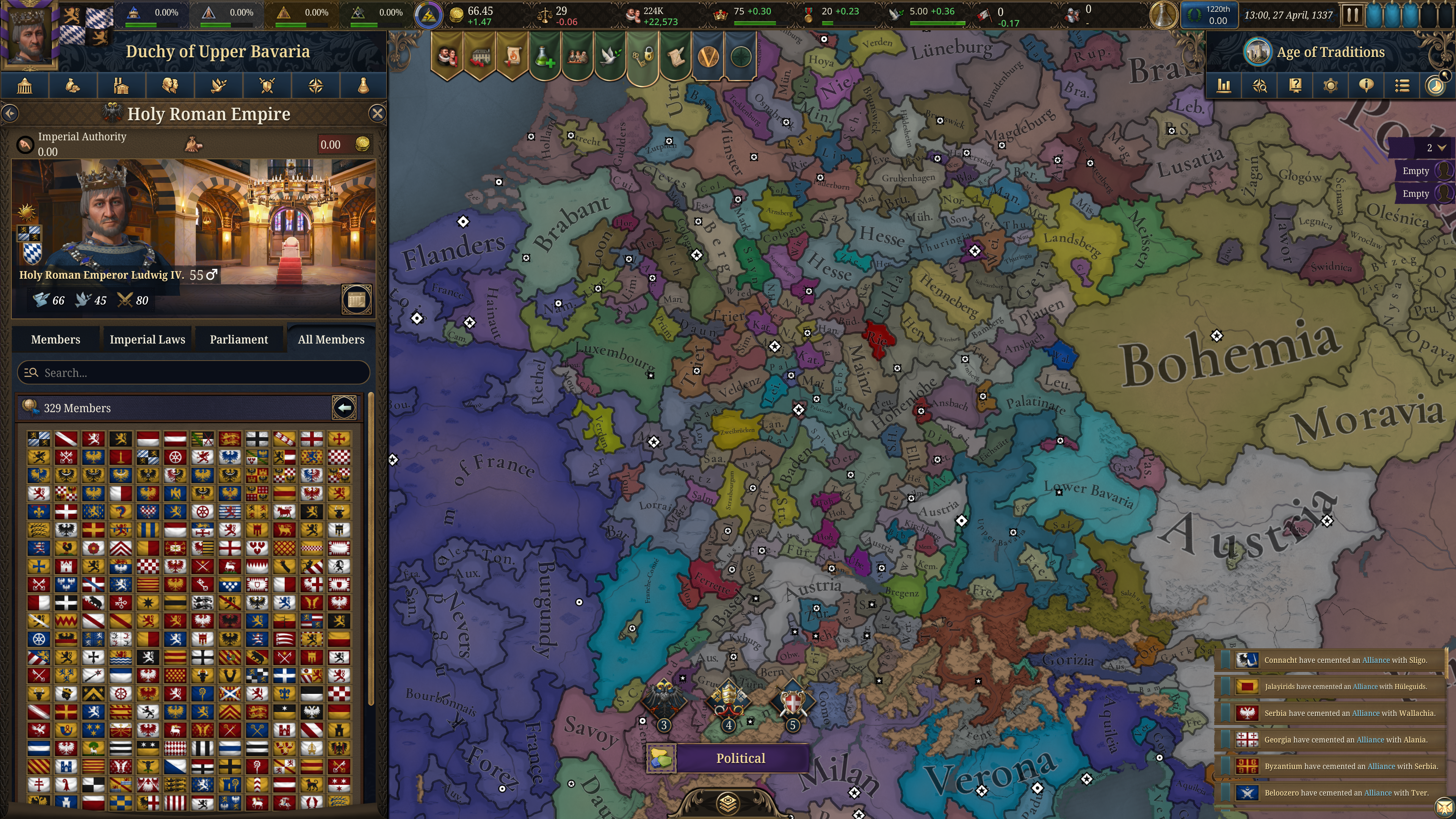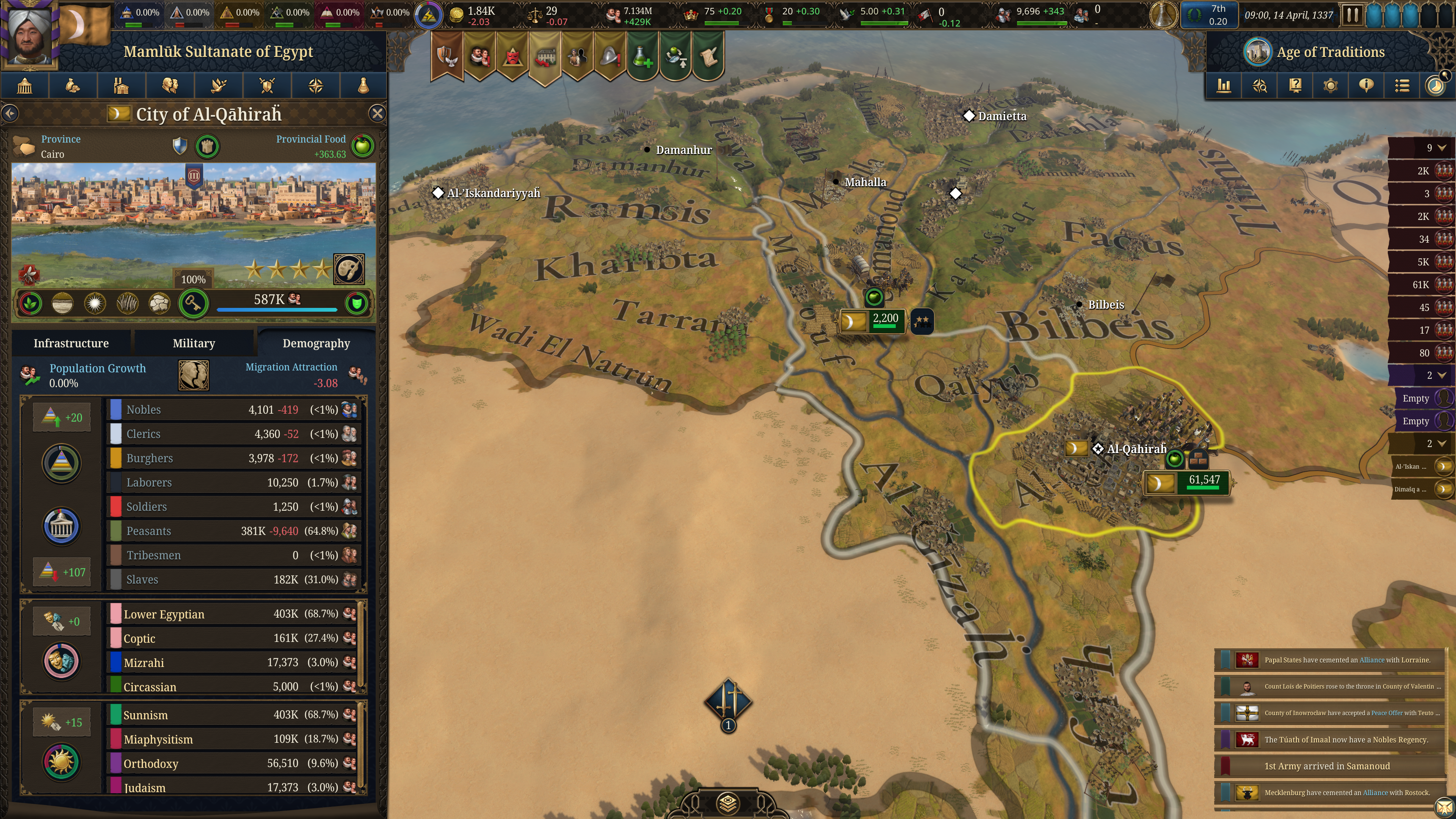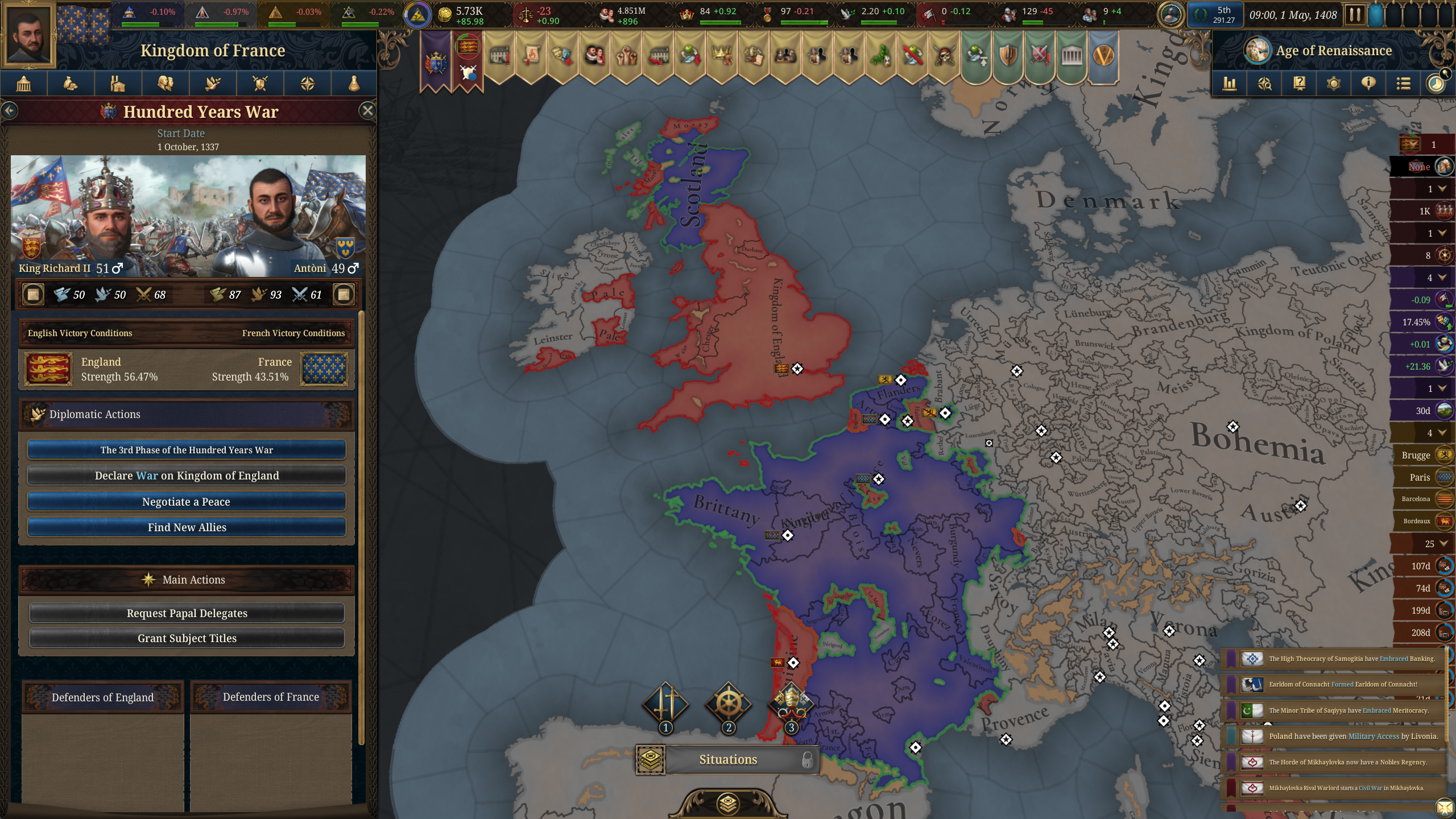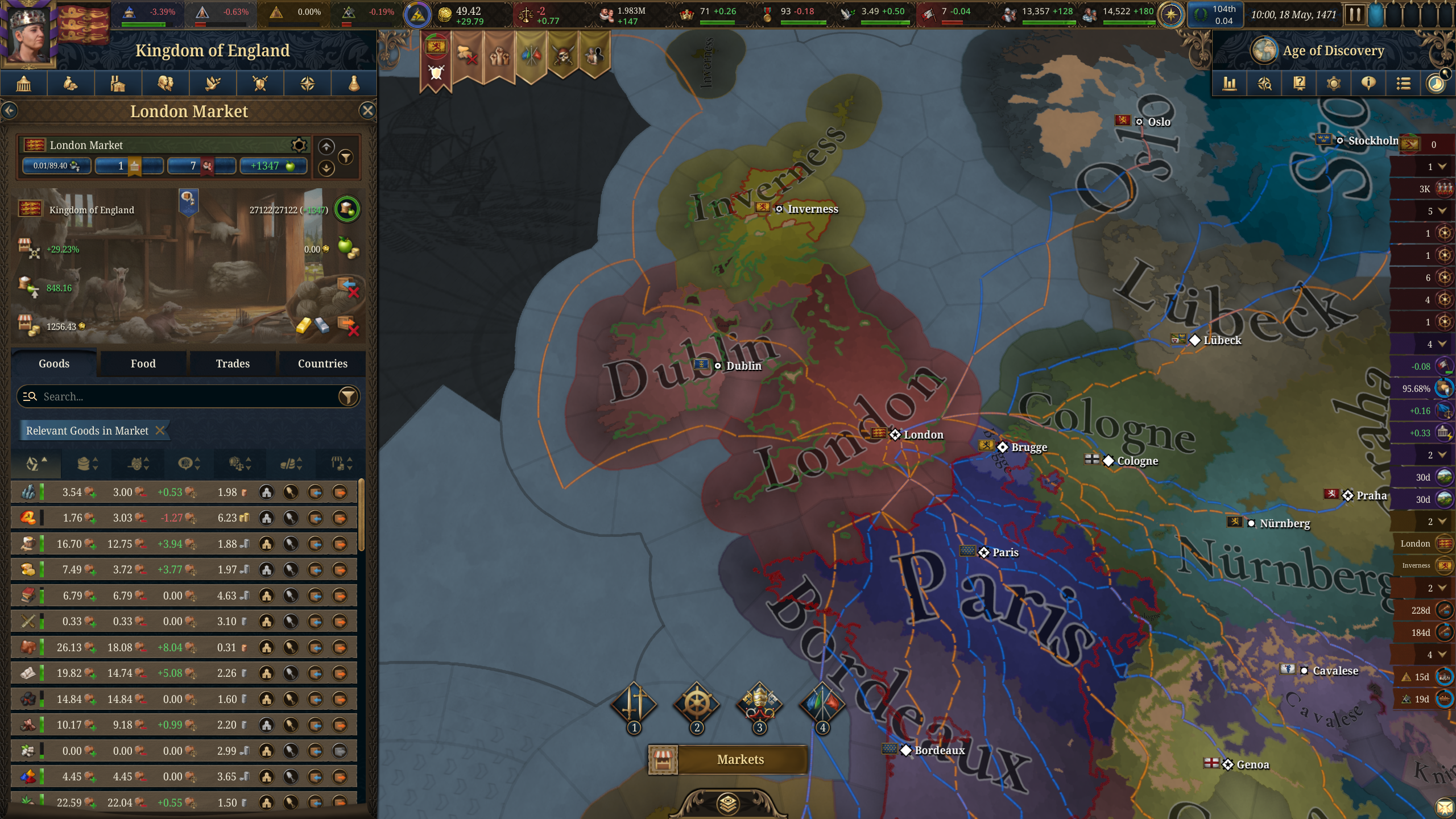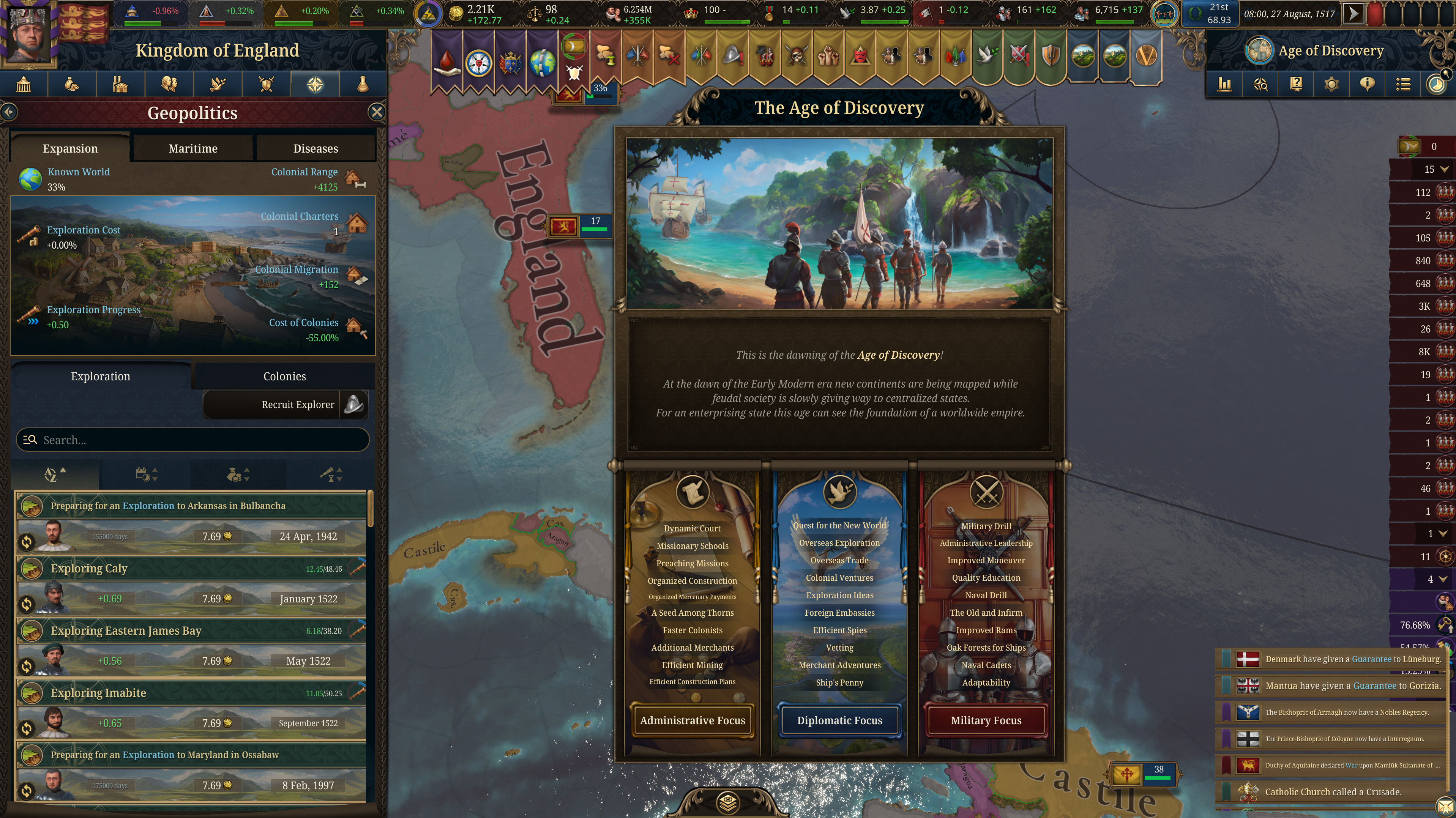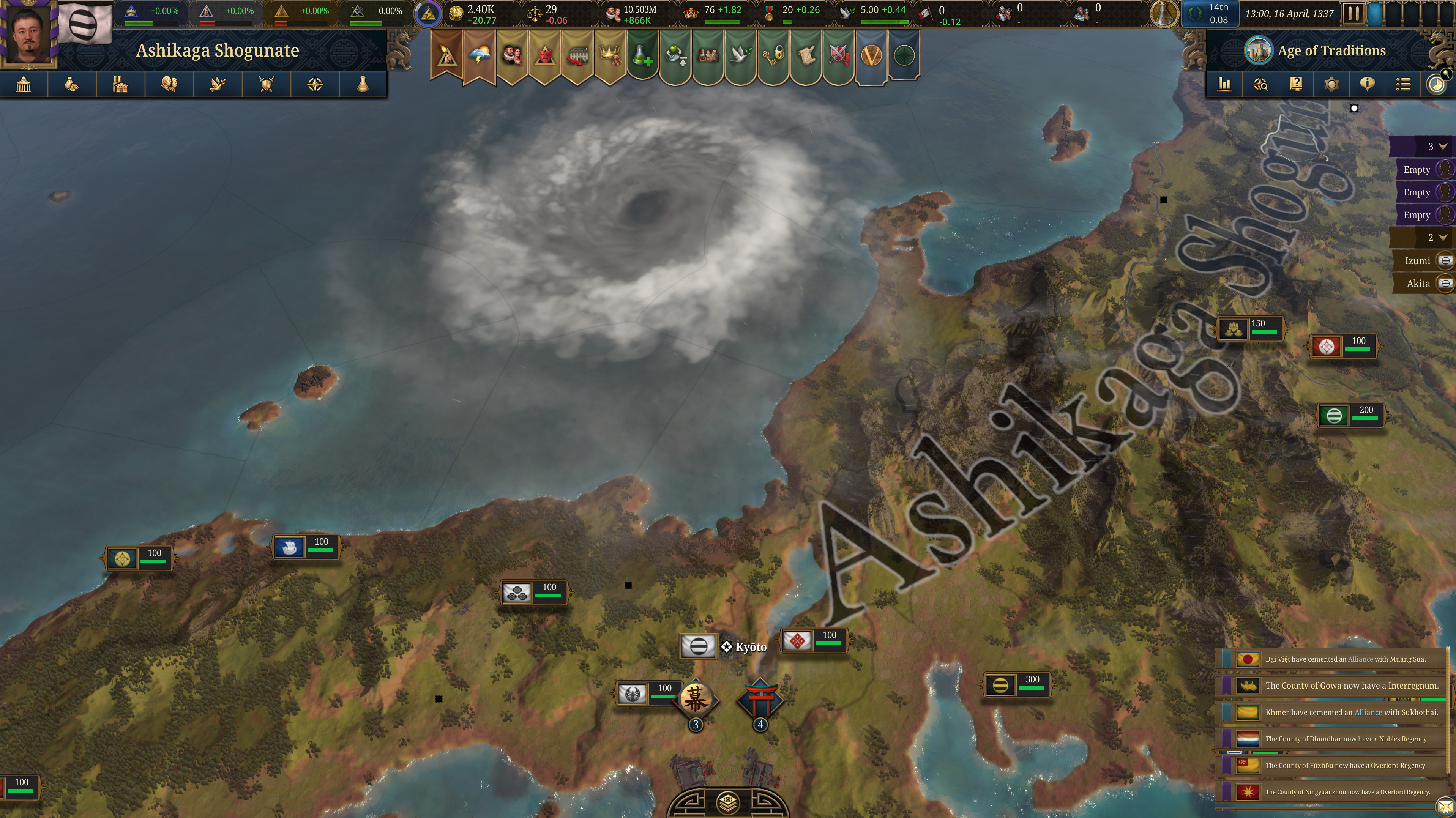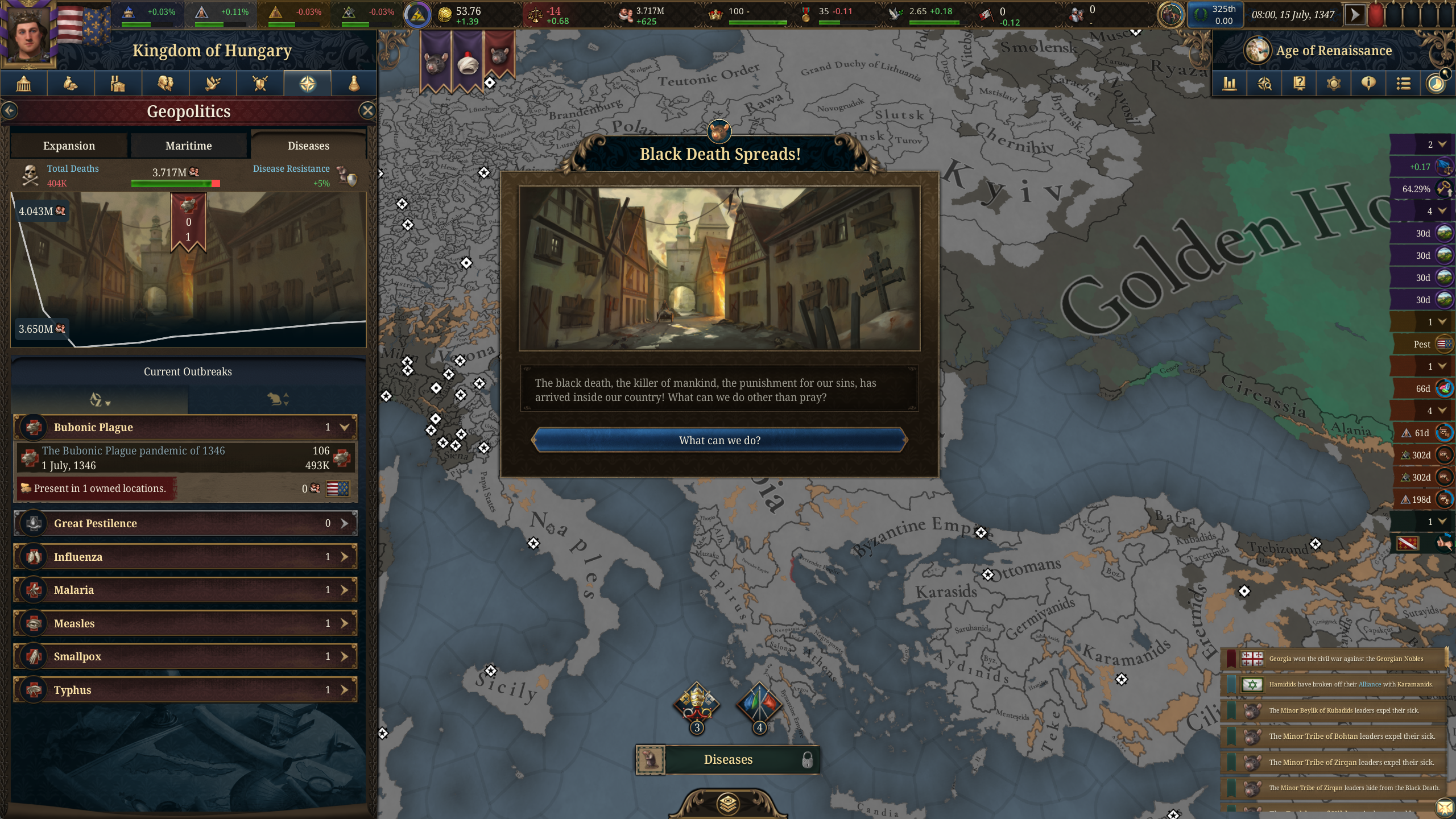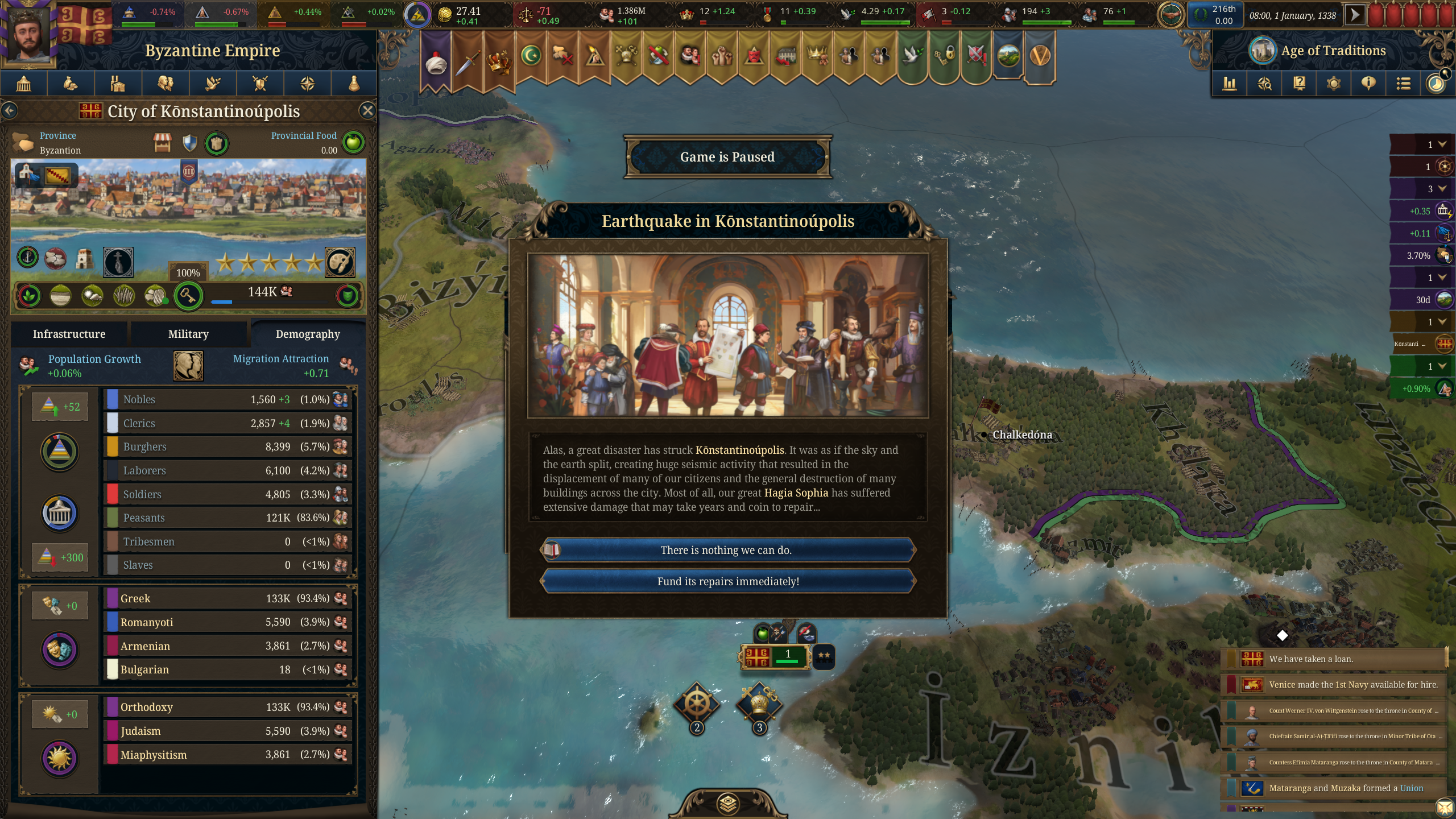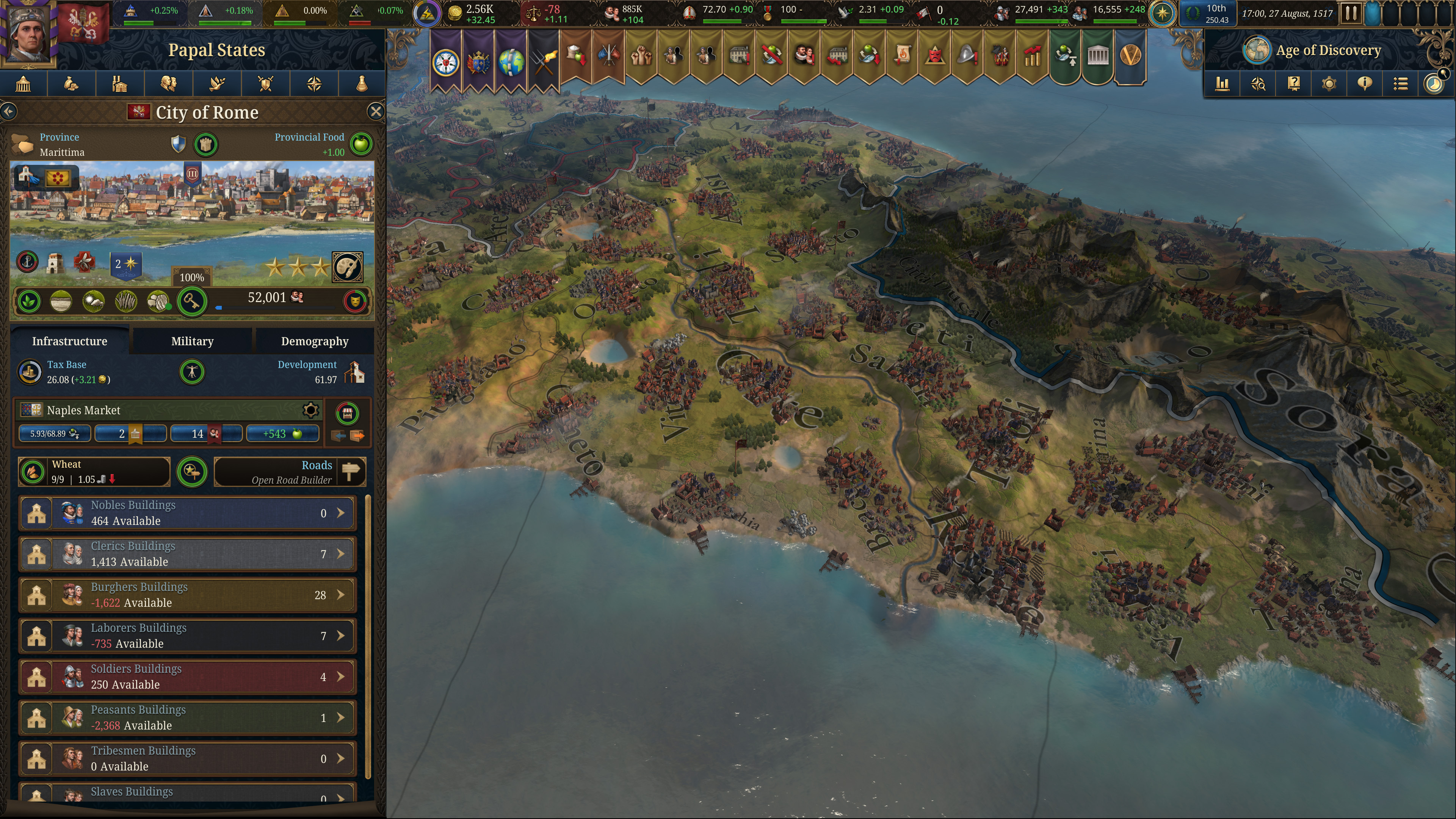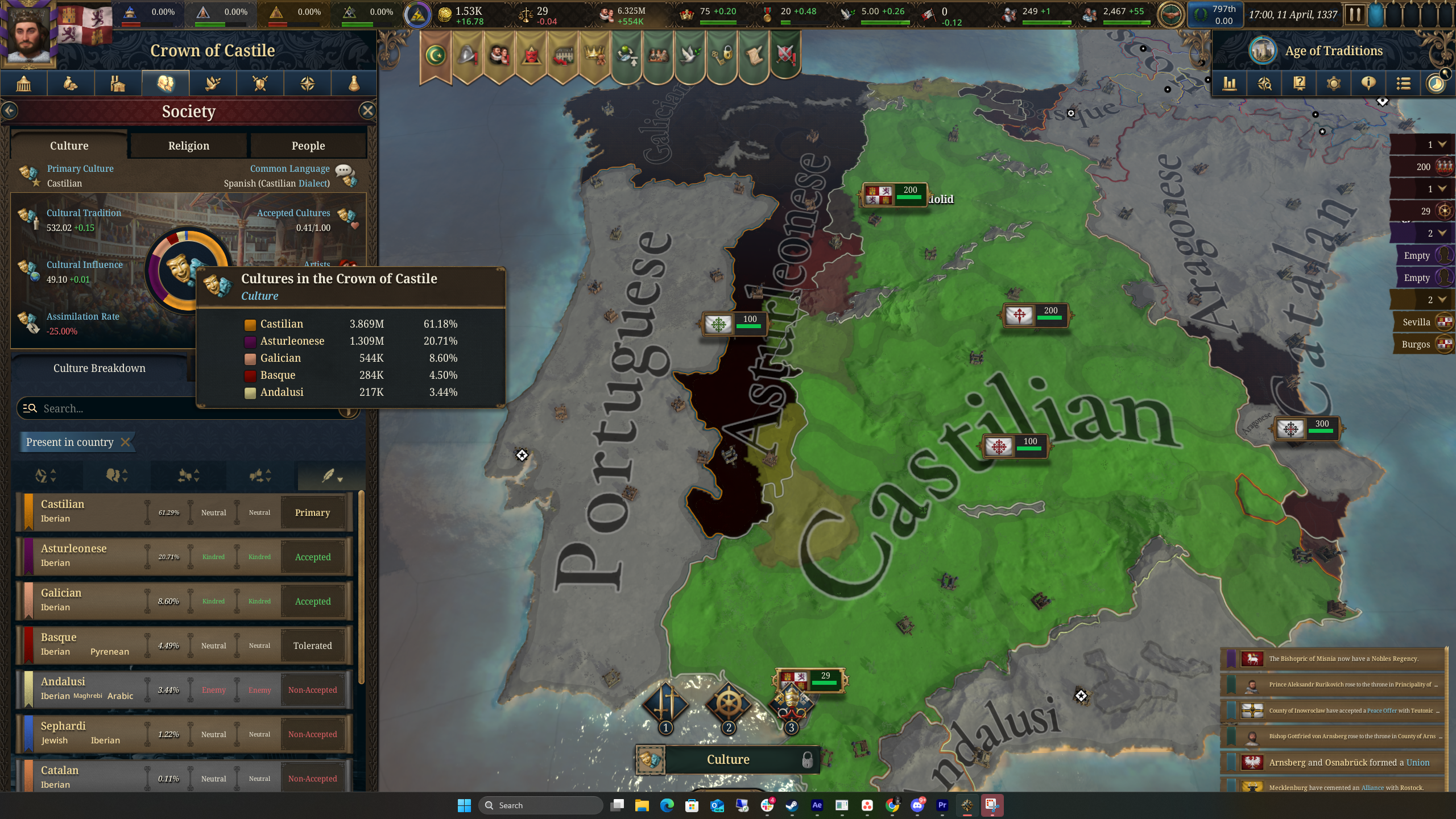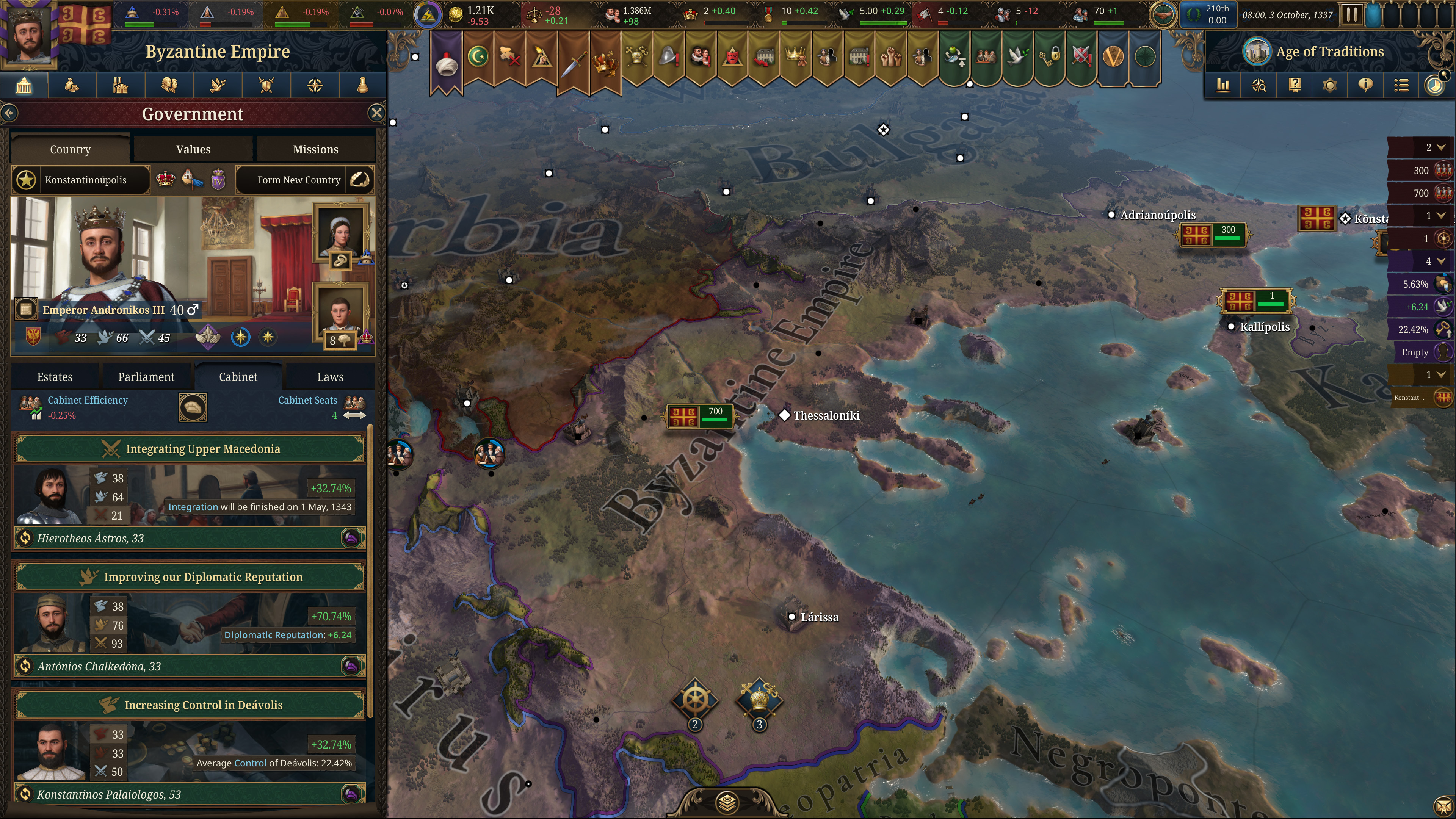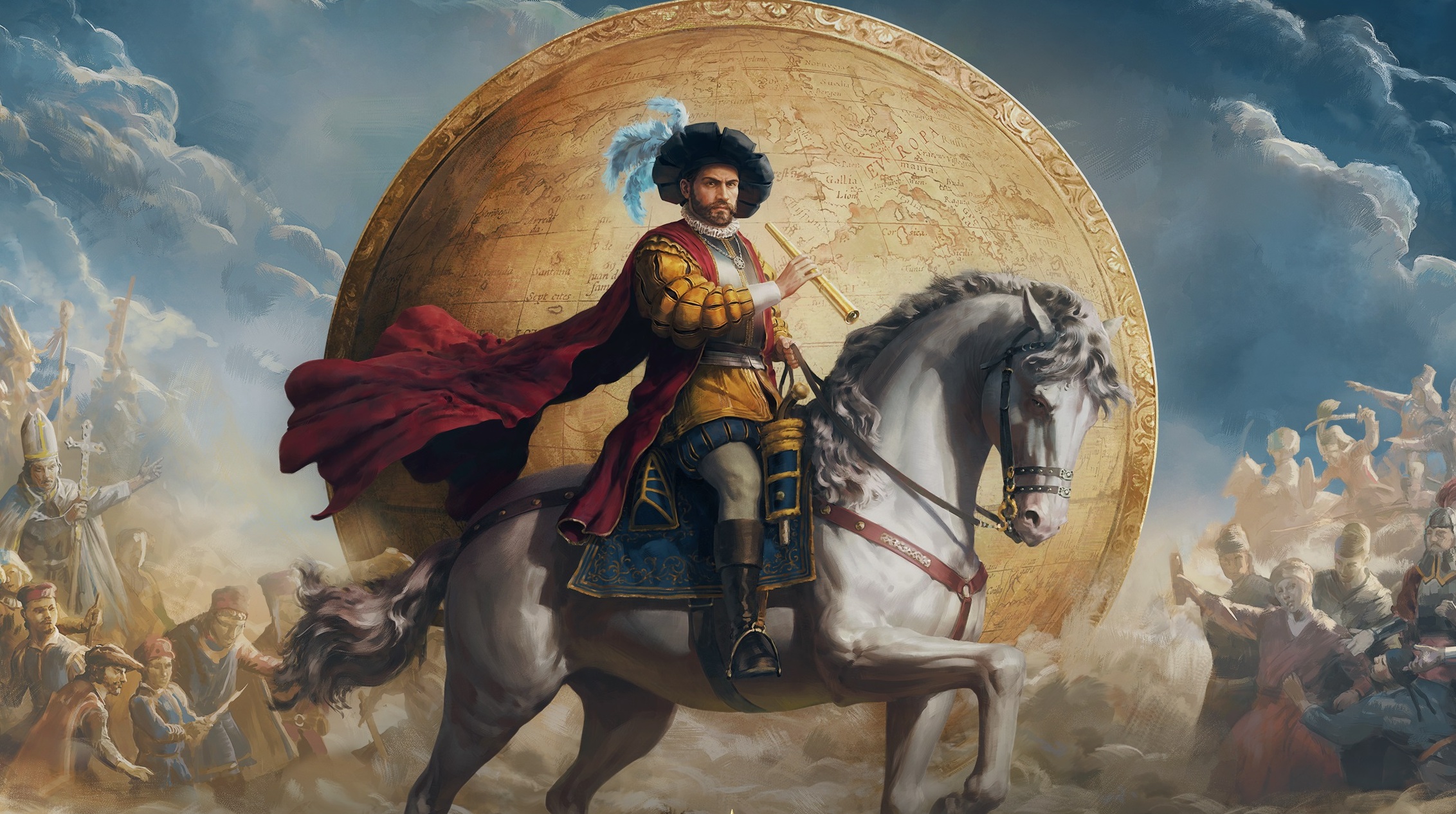
This beast is going to take hundreds of hours to unpack, and I can't wait.
Paradox has finally unveiled the worst-kept secret in strategy gaming: Europa Universalis 5 is coming. This reveal also means I can finally talk about my failed attempt to unite the British Isles under Scotland, my tumultuous conquest of Byzantium as the Ottomans, and how even after many hours of unravelling this behemoth it still makes me feel like a stupid child.
While Crusader Kings is the series that really introduced Paradox’s complex brand of grand strategy to the wider world, the long-running Europa Universalis series has always been the company’s flagship. But the 12-year-old Europa Universalis 4 is already so dense and wide-ranging—especially when you take into account the vast number of DLCs—that it’s pretty reasonable to wonder what a sequel could really offer.
So let’s get this out of the way: it’s pretty damn different. So much so, in fact, that I have spent a considerable amount of time being pleasantly baffled by its myriad complex systems, rules and ridiculous flexibility. EU feels new again, and learning the ropes like a novice has been a delight.
What’s new?
Let’s get the headline changes out of the way, shall we?
- EU5 has removed a significant level of abstraction by filling its provinces with diverse pops, like Victoria 3, which have different cultures, religions and needs. This makes managing your population considerably more complex.
- The removal of ‘mana’ also helps EU5 shed more abstraction, as you’re no longer collecting points to spend on actions. Instead, the success of your actions, whether they are diplomatic, administrative or military, depends on the skills of named-characters placed in positions of power, like your cabinet.
- The economic and trade systems are significantly richer now. Your provinces can gather goods or produce them in buildings you construct, which can then be used to satisfy your needs or sold on the market. Some buildings need specific goods to function, and these buildings also need workers, as well as cash investment.
- This isn’t a CK game, but characters are pushed more to the forefront this time. They don’t have the rich lives of your CK dynasties, but there’s still some drama, and they don’t feel like simple tools anymore.
- Everything can be automated. Not ready to get into the economics game? No worries. Just let the AI handle it. Want to focus on exploration instead of warfare? The AI can deal with all the bloodshed for you. You can automate entire families of systems, or go more specific, just telling the AI to manage your local market.
The most striking thing about EU5 is how uncompromising it feels. With CK3, there was a real sense that Paradox was inviting everyone to the party. Yes, it’s still a party with complex rituals and interactions and not everyone is going to have a great time, but it felt welcoming all the same. EU5 is more of a private shindig. Something for the hardcore. The history devotees. The number crunchers. The grand strategy fetishists.
I don’t want to paint it as impenetrable. Not completely, anyway. EU5 doesn’t eagerly invite everyone in, but it does invite everyone to become the sort of person who’d feel right at home here. The build I played doesn’t have a tutorial and does little to give players, old or new, a way to ease into things, but the automation is still evidence of modern Paradox’s desire to not just throw players to the sharks.
I don’t want to paint it as impenetrable. Not completely, anyway.
Like Distant Worlds, the excellent space 4X, you’re blessed with the ability to automate every part of your burgeoning empire. This means you can let the AI handle the stuff you don’t care about, but it’s even more helpful in letting you learn how to play, system by system. Based on the preferences you establish when you start a game, EU5 will suggest a nation for you, and then automate broad families of systems. You can fiddle with this right from the get go, turning on or off whatever you want, whether that’s every system devoted to conquest, or just one specific nugget of the game.
Even with this assistance, however, EU5 is… well, it’s a lot. In removing so much of the abstraction and more board-game-esque elements, Paradox has created something that’s so much deeper and fascinating than its ancestors, but so much trickier to grasp.
War college
As I always do when I embark upon a new Paradox misadventure, I began in Scotland. My goal? Spank the English. It’s typically a tall order. Even distracted by the Hundred Years War, the English begin with simply more of everything. More cash, resources, manpower (but yes, more enemies too).
Scotland also begins in the midst of a civil war between the Bruce diehards and the English-loving Balliol loyalists. Naturally I picked the good guys. Sorting out the civil war was simple enough, and anyone who’s played a Paradox grand strategy game in the last decade and change will broadly understand how you win a war—win fights and sieges, and grab territory, raising your warscore. OK, it’s not actually remotely that simple, but I ain’t writing a guide here.
Even with a united Scotland, though, I wasn’t even close to ready to take on the southerners. Unfortunately, I had to take a leaf out of the English playbook and start gobbling up Ireland. But hold on, because one does not simply declare war in EU5. I mean, you can do that if you really want to, but declaring war without a casus belli means that everyone thinks you’re kind of a dick, and you do need some international friends if you’re gonna get by.
In CK3 and EU4, you can simply command a minion to fabricate a claim on some territory, and voila: casus belli. But this is too gamey for EU5. Instead you need to come up with a legitimate reason, and use your spies, which takes time. But even then, it might simply be impossible to come up with a solid reason why you have to invade another country, and to screw over the English is not, it turns out, a valid reason.
When all else fails, you’ll need to get help from your parliament. While EU4 had parliaments, these institutions are considerably more involved this time around. They represent the estates of your nation, which in turn broadly represent your pops and their competing interests. They have all sorts of agendas, and also powers that you can take advantage of, but only if you can get enough of them to agree. And if you want them to support a new war, you might struggle to pass anything else on the agenda.
This allowed me to begin my conquest of Ireland, starting with Ulster, and halting England’s plans for the island. But I had plenty of domestic issues to deal with at the same time. There was friction, you see, between the Highlanders and Lowlanders, the traditionalists and urbanites. I kept having to make decisions about embracing the old ways, the clans and an agrarian society, or supporting the expansion of our cities and the newer burgher class.
Naturally, this had an impact on how pleased the estates were with my rule, but it also affected everything from the economy, to my international relationships, to the legal system, to the national language. By favouring the clans and changing the court language to Gaelic, I was popular with the clans and aristos, but this weakened my connection to Europe, specifically my old ally France, and made the city-dwellers pissed off.
To appease irate estates, you can grant them more privileges, which can also come with benefits for you, but there’s risk involved: you don’t want to empower an estate that might become disloyal. But their fortunes can change, too. A dominant estate’s power can be eroded over time, eventually becoming completely obsolete and ultimately being replaced.
With so many competing concerns, both domestic and international, my dream of outperforming the English started to feel a lot more unrealistic. I realised that, despite decades of experience with Paradox’s grand strategy games, I needed to start with something a bit more straightforward.
Put your feet up
My Ottoman campaign had a very different flavour. The Ottomans start in a much stronger position than Scotland. A burgeoning superpower, it’s the big boy of Anatolia, has a standing army, and it’s just on the cusp of being able to spank waning Byzantium. Like I said, there’s no tutorial yet, but this feels like a great place to begin.
What makes an Ottoman campaign so rewarding is the extra narrative components. Certain historical flash points, like the aforementioned Hundred Years War, or the Ottoman rise to prominence, are handled by bespoke ‘situations’, which come with their own special mechanics. So as the Ottomans, you can hit up a special menu and, for example, claim more Anatolian territory, giving you an instant excuse for warring against a neighbour.
Then there are the semi-random events that crop up from time to time, giving you discrete objectives or letting you annex entire nations without a fight. Some of these events give you choices, and in cases where this is an event based on real history, you can see what the canon option is before you make your choice.
So EU5 gently nudged me in the right direction, putting me in a position to swallow up all the surrounding territory and either keep building up my power or just conquer Byzantium a century early. But in this reactive, dynamic world, making too many big moves can be a big risk. Sure, you might easily be able to sack Constantinople, but being too aggro will inspire coalitions of nations to rise against you, forcing you into a much larger, bloodier conflict.
Maybe you’re ready for a war of that scale. I was not. I was too busy dealing with all my prospective leaders trying to kill each other following the death of the last one, in turn gutting my pool of potential advisors and cabinet ministers. That was a bit of a problem, given that they are one of the most important expressions of your power, allowing you to integrate provinces, increase your nation’s stability and improve your diplomatic standing with your neighbours.
I was too busy dealing with all my prospective leaders trying to kill each other following the death of the last one.
So even with the odds stacked in my favour, I was still very busy, increasingly sweaty and extremely sweary. It’s like trying to play Hearts of Iron, March of the Eagles, Crusader Kings and the older Europa Universalis games all at the same time. I feel like I’ll need at least 100 hours just to wrap my tiny brain around just the trade and economic side of things.
The dynamism of the markets, the influence of buildings, the myriad factors that impact supply and demand, the effect politics and diplomacy has on commerce—I’m not ashamed to admit that I left this up to the AI a lot of the time. But I still had to get stuck in from time to time, because the AI just picks what it perceives as an optimal strategy, which can’t really take into account what the player might be trying to achieve.
A trip to the country
Let’s just say it’s going to be a while until I feel up to running Venice or, even more daunting, the Hanseatic League. Because, yes, you don’t just play regular countries in EU5. Instead playable entities are broken into four different types.
- Settled country
- Army-based country
- Extraterritorial country
- Society of pops
A settled country is your default nation. Your Scotlands and Ottoman Empires. An army-based country is one defined by its military—at least to the degree that as long as it has an army, the nation persists. Even if it doesn’t own territory. These are your hordes. Extraterritorial countries include the Hanseatic League, and serve specific functions based on buildings they own. They don’t own land per se, but they do rule subjects with land. Banks, trading companies, holy orders—these are all extraterritorial countries. A society of pops, meanwhile, is a less settled, tribal group, which doesn’t have all the powers of an official state.
Naturally, this opens the door to all sorts of new playstyles and strategies. As a banking country, for instance, you can get fat on international debts, taking over loans and then forcing those nations to pay you the interest instead, filling your coffers so you can embark on big projects. And these specialist countries also get their own bespoke advances, as well, letting you refine and develop them in unique ways.
Advances can net you new reforms, laws, estate privileges and mechanics, and are in part defined by the global historical age. Which ones you have access to can also be determined by what nation you’re playing as. So in my Ottoman game, a lot of my early advances were connected to Islam, but I could also research more generic ones relating to things like merchant guilds or naval supremacy.
The system feels less gamified than a typical strategy tech tree, in large part thanks to concepts like the aforementioned age mechanic, and the institutions that these ages spawn.
So the game’s second age, the Age of Renaissance, grants new potential advances everyone has access to, while also spawning game-changing institutions like the Renaissance, banking and professional armies. These can spawn dynamically or in their historical locations (something you can determine yourself), and then, like all good ideas, spread through your population, and once enough people have embraced these new concepts, you can start researching the special advances these institutions provide.
These fancy new ideas can then spread abroad, through trade routes and across borders, and I am a big fan of how this encourages you to start thinking globally, lest your nation be left behind while everyone’s getting to play with new toys. Taking advantage of this spread also requires you to start thinking about the literacy of your population, and your nation’s social classes, both of which impact how quickly ideas spread.
Get lost
I’ve lost entire afternoons to what at first seemed like simple objectives. “I want to explore this Renaissance thing the Italians are going on about” could lead you down a rabbit hole as you delve into the trading system, select advances and reforms that promote literacy, encourage urbanisation and elevate the burgher class. Systems on top of systems on top of systems. And when you think you’ve reached the bottom? Nope. More systems.
While this is daunting, it just feels so organic that I didn’t feel utterly overwhelmed. Or at least I was too busy to notice it. I found myself just going in for a nibble, dipping my toes in and trying to focus on a single goal, and then a few hours later I’d come up for air and realise I’d gained three new degrees.
I don’t want to get too far ahead of myself, though. As I’ve already mentioned a few times, EU5 makes me feel very, very stupid. And some of that is down to the UI being a work-in-progress, or the tooltips not always being clear enough, or systems not entirely working as intended. But mostly it’s just because EU5 is unrelentingly ambitious, breaking away from its ancient board game origins in a way Paradox has never attempted before. Playing it, and being so utterly baffled by it, is a thrill.
